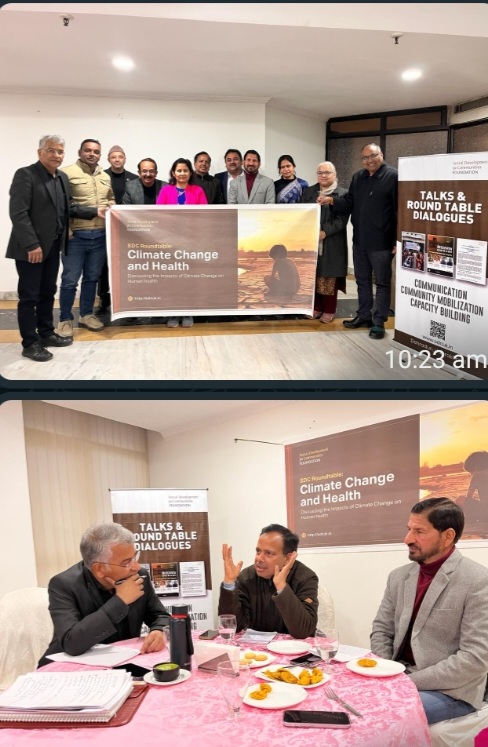Dehradun: Uttarakhand grapples with a pressing climate crisis, exacerbated by the Himalayan region's disproportionate exposure to climate change.
Chief Minister Pushkar Singh Dhami's government, however, lacks a robust response to this urgent challenge. The SDC Foundation convened a pivotal roundtable, shedding light on the critical need for climate justice in Uttarakhand.
The roundtable dialogue was organized by environmental action & advocacy group, SDC Foundation, and attended by those such as surgeon and writer Dr. Mahesh Bhatt; former Scientist at Wadia Institute of Himalayan Geology Dr. P.S. Negi; Chief Medical Officer (CMO) LBSNAA, Mussoorie Dr. Mayank Badola; gynecologist Dr. Meghna Aswal; former Additional Director, Uttarakhand Health Dept, Dr. S.D. Joshi; UNDP State Head Uttarakhand Dr. Pradeep Mehta; Fellow at Centre for Ecology, Development and Research (CEDAR) Dr. Nidhi Singh; Uttarakhand Health Department’s IEC Officer Anil Sati; Social worker
Dr. Mahesh Bhatt began the roundtable and expressed concern at how there was an immediate need for bringing climate justice to the table when talking about climate change.
“I might be using two cars, air-conditioning and 10 light bulbs in my house and be safe.
However, my cousin in a remote village in Uttarakhand might witness his fields being washed away from a cloudburst, which happened due to climate change, in which I too have played a part,” said Dr. Mahesh Bhatt.
Agreeing to how everything is interconnected, Dr. PS Negi cited the example of how particulate matter emitted from fires and fossil fuels are increasing the temperatures and becoming a cause for receding snowlines and glaciers. “Climate change affects everything – ecology, economy, health, and wellbeing. Entire species of medicinal plants in the Higher Himalayas are at risk.”
Dr. Mayank Badola said that Uttarakhand government is working on bettering its healthcare in the face of climate change by capacity building, IEC robustness, and making healthcare facilities less polluting.
“We need more efficient surveillance systems and detection systems for diseases, especially those that are vector borne,” he said, adding, “Those living in the mountain areas and coastal regions are most susceptible to climate change. Thus, there is as much a need for mitigation as adapting measures.”
Dr. Meghna Aswal brought her own experiences to the fore and shared how she has seen a direct connection between rising atmospheric temperatures and preterm labor and heat stress in pregnant women, as well as low birth weight and fetal distress in newborns.
“Even as covid was taking its toll, we actually saw a decrease in asthma patients due to low air pollution levels. Scientific evidence also shows a connection between air pollution and neurodevelopmental and neurodegenerative disorders,” she said.
Dr. S.D. Joshi shared how he once saw a post mortem report of a young male with black lungs and he wasn’t a smoker; he worked in the transport sector.
“Microplastics, black carbon and so many other forms of pollution are causing a surge in diseases such as strokes, heart attacks, diabetes, thyroid dysfunction, and so on,” he said.
UNDP’s Dr Pradeep Mehta spoke with reference to the entire Himalayan belt and said his own studies and work had shown entire apple belts vanishing and even several varieties of rajma becoming extinct.
“Our culture of crop diversity and bara anaja (12 grains) is fast dying, which is impacting our nutrition intake. Studies show that the number of climate migrants has far overtaken the number of war migrants, which is a cause for extreme urgency.
Despite these stark revelations, Chief Minister Pushkar Singh Dhami's administration appears unresponsive to the unfolding crisis.
The SDC Foundation President Anoop Nautiyal passionately implored citizens to elevate this critical issue, stressing the imperative need for comprehensive strategies to both mitigate and adapt to the escalating climate crisis in Uttarakhand.








